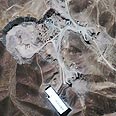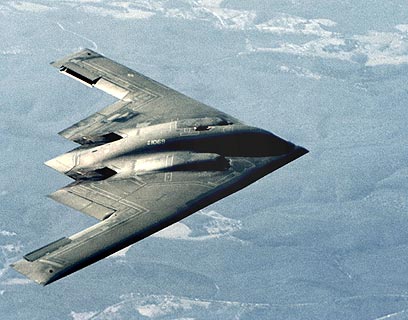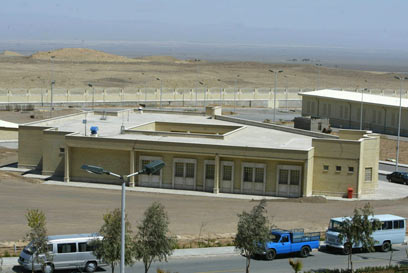
US seeking mightier bomb against Iran
Pentagon officials believe their largest 'bunker buster' bombs are incapable of destroying Islamic Republic's fortified nuclear facilities, submit request to Congress for funding to enhance bomb's penetration ability
According to the report, Pentagon war planners have reached the conclusion that the conventional 14-ton bombs are insufficient and should be improved.
Related stories:
- UN chief says onus is on Iran in nuclear dispute Barak: Iran 'drifting' toward nuke goal line Op-ed: Israel will have to strike
The main concern is Iran's Fordow uranium enrichment site near the city of Qom. The facility, which includes a new type of centrifuges, is located under a mountain. According to a former senior US official who is an expert on Iran, a tactical nuclear weapon may be the only military option to destroy the facility.
"Once things go into the mountain, then really you have to have something that takes the mountain off," the official said.
US Defense Secretary Leon Panetta acknowledged in an interview with The Wall Street Journal Thursday the bombs shortcomings against some of Iran's most deeply fortified bunkers.
He said more development work was required and that he expected the bomb to be ready to take on this challenge soon. "We're still trying to develop them," Panetta said.

B-2 Stealth Bomber designed to carry heavy bombs (Photo: AP)
"The development of this weapon is not intended to send a signal to any one particular country," Pentagon Press Secretary George Little said. "It's a capability we believe we need in our arsenal and will continue to invest in it."
Panetta stressed that even today the heavy bomb could cause "a lot of damage" to Iran's underground nuclear facilities but wouldn't necessarily destroy them outright.
"We're developing it. I think we're pretty close, let's put it that way. But we're still working at it because these things are not easy to be able to make sure that they will do what we want them to," the secretary of defense concluded.

Natanz facility expected to be more vulnerable to bombs (Photo: AFP)
The Pentagon this month secretly submitted a request to Congress for funding to enhance the bomb's ability to penetrate deeper into rock, concrete and steel before exploding, officials said.
According to the Wall Street Journal, the Defense Department has spent about $330 million so far to develop about 20 of the bombs. The Pentagon is seeking about $82 million more to make the bomb more effective, according to government officials briefed on the plan.
Senate concocting more sanctions
Meanwhile, the US Senate Banking Committee expects to vote Thursday on legislation containing more economic sanctions on Iran, the panel's leaders announced on Friday.
Lawmakers want to increase pressure on Iran by further reducing its oil revenues, in hopes of discouraging Tehran from trying to build a nuclear bomb.
The announcement gave no details of the upcoming legislation, saying they would be released next week. The bill has bipartisan support, said the statement by the Senate panel's chairman, Democratic Senator Tim Johnson, and its ranking Republican, Richard Shelby.
Among the provisions that lawmakers' aides have said are under discussion in the Senate are some that could lead to US penalties against Iran's oil tanker operator, the National Iranian Tanker Company (NITC), and the National Iranian Oil Company (NIOC).
Others would sanction foreign entities that buy oil from affiliates of Iran's Revolutionary Guards Corps.
The proposed measures are being rushed forward even as President Barack Obama is struggling to implement the last round of sanctions on Iran approved by Congress late last year.
Sanctions on foreign banks handling transactions related to Iranian oil sales became US law on December 31, but have not gone into effect yet. The Obama administration is determining how aggressively it will implement them and could being applying them in late June.
"On February 2, we intend to move forward with a markup," Johnson and Shelby said in their announcement, using legislative language that refers to a committee vote on a bill.
"We must continue to do all we can – diplomatically, politically and economically – to counter the growing threat from Iran's illicit nuclear program," they said.
"Our sanctions legislation will complement and reinforce ongoing international efforts led by the US and send another very clear signal to Iran's government of what's in store if they continue to defy the will of the international community," it said.
The US sanctions are among a number of western trade and banking embargoes aimed at pressuring Iran. Western powers suspect Iran is using a nuclear energy program to give itself the ability to build atomic bombs. Iran says its nuclear program is for peaceful purposes.
The US House of Representatives passed two bills on December 14 that would expand oil-related sanctions on Iran and close loopholes in the sanctions laws. Parts of these bills are among the measures being considered in the Senate.
But one provision approved by the House may not see action in the banking committee, because it does not fall under its jurisdiction. It would ban ships from US ports that have recently landed in Iran, North Korea, or Syria.
Reuters contributed to this report
- Follow Ynetnews on Facebook and Twitter
- Receive Ynetnews updates directly to your desktop










